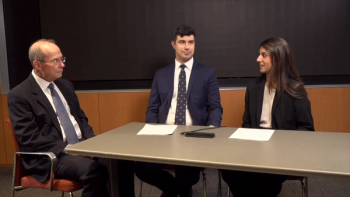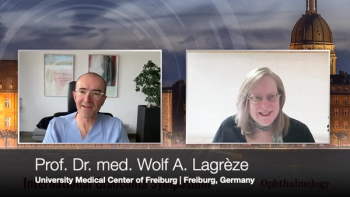
- Ophthalmology Times: June 1, 2021
- Volume 46
- Issue 09
Home IOP monitoring may be aftereffect of COVID-19 pandemic
Option could prove to enhance safety for both patients and staff.
Reviewed by Erika Moxley, MS, and Ze Zhang, MD
Ophthalmologists, like many physicians and surgeons worldwide, had their practices dramatically affected during the
The greatest roadblock was that telemedicine is limited within ophthalmology, leading to a reduction in the in-person examinations required to ensure the best possible patient care.
Related:
A survey of members of the American Glaucoma Society (AGS) showed that glaucoma specialists must recognize the changes in response to COVID-19 and modify practices to improve patient outcomes and keep patient and staff safe.
Under these circumstances, using devices in the home to monitor IOP may facilitate more virtual visits and decrease the risk of exposure for patients and physicians, according to Erika Moxley, MS, a medical student at Tulane University School of Medicine, and Ze Zhang, MD, assistant professor at Tulane University School of Medicine’s Department of Ophthalmology in New Orleans, Louisiana.
The survey
The investigators conducted a cross-sectional, anonymous survey of the AGS membership in the United States and Canada to assess the changes in patient volume and patient care, including the adoption of telemedicine, during the pandemic and to determine how patients with glaucoma can be served better in future similar situations.
The survey was disseminated using the AGS listserv in May 2020. Glaucoma specialists were asked about their practice patterns and changes in practice since the start of the pandemic.
Related:
The authors reported that 57 practices completed the survey, 71% of which were from private practices, 27% from a university-based medical center, and 2% from a managed care hospital, for about a 10% response rate.
Most respondents were in the Northeastern US, followed by the South, Midwest, West, and Canada. The physicians reported that three-quarters of their practices were involved in glaucoma management.
Survey results reflected dramatic decreases in weekly clinical volume by 78% and in surgical volume by 70%.
The authors reported that from March 18 to May 2020, “63% of respondents had not performed any cataract surgeries, 74% had not performed any minimally invasive glaucoma surgeries, 50% had not performed any trabeculectomies and 11% had performed more than 5, 70% had performed at least 1 tube shunt, 39% performed at least 1 cyclophotocoagulation procedure, 30% had changed the types of surgeries they performed due to limitations of follow-up and risk of exposure for patients, and 18% believed that they would make changes.”
Related:
By May 2020, telemedicine was being incorporated into practice by a majority of the physicians.
In addition, approximately 50% of the physicians indicated that to ensure patient and staff safety they were not going to abandon the implemented practice and surgical changes any time soon.
The survey results emphasized how quickly and dramatically the physicians implemented changes in their practices.
“Surgeons surveyed were more likely to perform glaucoma surgeries than cataract surgeries during the pandemic, likely due to the vision-threatening nature of glaucoma,” the investigators commented. “When choosing procedures for glaucoma, surgeons reported preferring procedures with a lower risk profile and the need for fewer follow-up visits during the pandemic. It remains to be seen how long-term patient outcomes have been affected.”
They urged physicians to modify their practices with the goal of improving patient outcomes and ensuring safety.
“Home IOP monitoring devices may be helpful in allowing more virtual visits, decreasing risk of exposure for all,” the investigators said.
--
Ze Zhang, MD
e:[email protected]
This article is adapted from a presentation at the American Glaucoma Society’s 2021 virtual annual meeting. The authors have no financial interest in this subject matter.
Articles in this issue
over 4 years ago
Quest continues for topical treatments for posterior segmentover 4 years ago
Ophthalmology: A pioneer in the field of artificial intelligenceover 4 years ago
Research: Treatment targets steroid-induced OHTover 4 years ago
IPL offers glaucoma biomarker for early-stage diseaseover 4 years ago
Targeting human retinal progenitor cell injections for RPover 4 years ago
AI predictive ability benefits from free text data in EHRsover 4 years ago
Ventriloquist eye examover 4 years ago
Benefits of topography-guided treatments for irregular corneasover 4 years ago
Taking a step forward in glaucoma patient careNewsletter
Don’t miss out—get Ophthalmology Times updates on the latest clinical advancements and expert interviews, straight to your inbox.





























